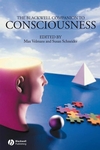 So I have hundreds of books on consciousness inherited from my father. Currently I am reading Velmans & Schneider (2007) The Blackwell Companion to Consciousness, which is a collection of essays on consciousness. My father made notes in the margin of the first several chapters. Over a period of a number of Sunday afternoons when my boys have crashed out, I have been snatching glances at it. I think I've finally got some coherent notes on the first three chapters.
So I have hundreds of books on consciousness inherited from my father. Currently I am reading Velmans & Schneider (2007) The Blackwell Companion to Consciousness, which is a collection of essays on consciousness. My father made notes in the margin of the first several chapters. Over a period of a number of Sunday afternoons when my boys have crashed out, I have been snatching glances at it. I think I've finally got some coherent notes on the first three chapters.Chapter 1: Frith & Rees (2007) "A Brief History of the Scientific Approach to the Study of Consciousness
On review the key question for me seems to be "how does mind emerge from matter?"
The difference between materialism and immaterialism seems impossible to prove (p.10) - seems like purely a matter of faith whether the "material" world exists or not.
Hick's (1952) demonstration that response time is proportional to information in signal, e.g. Log of #choices sounds is impressive (p.15) -- reminds me of my attempt to quantify meaning of a signal in terms of its ability to represent some simple world according to some representation.
Key question seems to be what is conscious awareness for (p.19/20). If some reasoning can be performed unconsciously it can't be just for reasoning itself. Makes me think of learning to ride a bike and that becoming unconscious. They mention handling novelty. If you can capture a rule you can make it unconscious, but if you have to juggle a set of things you haven't yet determined a rule for ...
Chapter 2: Tye (2007) "Philosophical Problems of Consciousness"
The problem of ownership seems like a red herring (p.24). I think pain could be transferred, and ultimately who cares about categories and properties of physical things? If my leg is amputated and attached to someone else it stops being my leg and the sense data coming out of it gets interpreted in a new way by the new person.
It seems to me that physical items ARE perspectival (p.25). Gold may be a particular element, but you have to experience it to know what it is. Mary the scientist who doesn't see a rainbow is just like the blind and deaf man who is supposed to fully understand what lightning is.We can never completely understand the subjective experiences of others no?
The problem of the mechanism of consciousness seems more serious (p.26), but the problem doesn't seem to me to require better understanding of individual neurons, but of the behaviour of assemblies of neurons to produce conscious awareness
Unconscious zombies seem irrelevant if they are undetectably different (p.28) - similarly for china body. My thinking here is very strongly influenced by the Mind's Eye book by Hofstadter and Dennet.
The problems of unity, transparency etc. all seem to be aspects of basic mechanism (p.32)
Chapter 3: Trevarthen & Reddy (2007) "Consciousness in Infants"
Infant and fetal developmental process all very interesting, but doesn't seem to relate at all to philosophical question of consciousness in terms of explaining contents of qualia. I totally accept Vygotskyian intersubjectivity, but this motivation for behavioral development seems unrelated to philosophical issue of C in terms of how can conscious awareness arises from functional organization of the brain. Of course a system that had a component for conscious awareness processing would not necessarily explain the contents of qualia, but might explain the sense of some processes that were conscious subsequently becoming unconscious.
That human consciousness is motivated by need for social communication is kind of a given, but it seems to me to come back to having a world model that includes a model of yourself, and I might now add that both those models needs be dynamic ...
